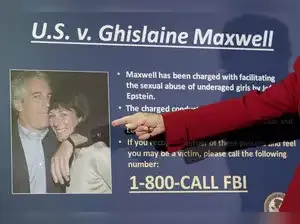U.S. Supreme Court has officially declined to hear Ghislaine Maxwell’s appeal, leaving intact her 20-year prison sentence for aiding Jeffrey Epstein in the sexual abuse of underage girls. The decision, announced Monday, closes the door on the British socialite’s final attempt to overturn her conviction.
ALSO READ: How big is the interstellar object 3I/ATLAS? Scientists reveal stunning new details
Why did the Supreme Court reject Ghislaine Maxwell’s appeal?
On the first day of its new term, the U.S. Supreme Court declined to hear the appeal from Ghislaine Maxwell, the former girlfriend and longtime associate of Jeffrey Epstein. The Court’s refusal means Maxwell’s 20-year sentence remains in place, marking another chapter in the decades-long Epstein saga, as quoted in a report by The AP.
As is customary, the justices did not explain their reasoning. The Trump administration’s Justice Department had urged them to stay out of the case, seeking to avoid reopening a controversy that had already drawn massive public attention.
Maxwell’s legal team claimed her prosecution violated a 2007 non-prosecution agreement struck between Epstein’s lawyers and federal prosecutors in Miami. That deal, they argued, also protected Epstein’s “potential co-conspirators” from federal charges nationwide.
However, prosecutors in Manhattan proceeded with the case, and an appeals court ruled the trial was valid. A jury ultimately convicted Maxwell on sex trafficking and related charges involving a teenage girl, as quoted in a report by The AP.
“We’re, of course, deeply disappointed that the Supreme Court declined to hear Ghislaine Maxwell’s case." “But this fight isn’t over. Serious legal and factual issues remain, and we will continue to pursue every avenue available to ensure that justice is done," her lawyer, David Oscar Markus, said Monday, as per a report by Politico.
Maxwell’s lawyers argued she was protected by a 2007 non-prosecution deal made with Epstein’s attorneys, but the justices dismissed the appeal without explanation, following the advice of the Trump administration’s Justice Department, which urged the Court not to intervene.
The only clear way for Maxwell to avoid serving the 20-year prison sentence a judge imposed on her in 2022 after she was found guilty at a jury trial in New York is through a possible pardon from President Donald Trump, the high court said Monday, without comment or a noted dissent from the justices, reported Politico.
ALSO READ: Super Harvest Moon to light up the sky this week — here’s when to see it best
The trial featured deeply disturbing testimony from four women who recounted sexual abuse they endured as teenagers at Epstein’s properties in the 1990s and early 2000s. Some of the victims were as young as 14.
Throughout her defense, Maxwell maintained her innocence. Her attorney, David Oscar Markus, said she was “innocent and never should have been tried, much less convicted.” Markus also led her Supreme Court appeal.
Neither Maxwell’s legal team nor the Bureau of Prisons explained why she was transferred from a low-security facility in Florida to a minimum-security prison camp in Texas. Reports indicate that the move occurred after Maxwell was interviewed by Deputy Attorney General Todd Blanche in July.
ALSO READ: Forget scratches — iPhone 17 now plagued by dropped calls and weak signals
Epstein, a wealthy New York financier, was arrested in 2019 on human trafficking charges involving dozens of underage girls. He was found dead in his jail cell a month later, in what investigators determined was a suicide, as quoted in a report by The AP.
The Justice Department later faced backlash for declining to release more investigative files from Epstein’s case. Officials argued that most materials were sealed by court order to protect victims and that “only a fraction” would have been made public if Epstein had gone to trial.
Despite those explanations, outrage grew among conspiracy theorists and some Trump supporters, fueled by online claims that a “client list” or hidden documents existed. Former conservative commentators Kash Patel and Dan Bongino, who later joined the FBI, were among those who had speculated on podcasts that Epstein’s “black book” was under FBI control, as quoted in a report by The AP.
However, the Justice Department reiterated that further disclosure was neither “appropriate nor warranted.”
Following the Supreme Court’s rejection, her legal options are effectively exhausted. The rejection from the nation’s highest court cements her role as one of the last remaining figures tied to the Jeffrey Epstein scandal, which continues to shadow political and legal institutions years after his death.
ALSO READ: Amazon Prime settlement payouts: Find out if you are eligible for a refund
Why did Ghislaine Maxwell appeal her conviction?
Her lawyers argued she was protected under Jeffrey Epstein’s 2007 non-prosecution agreement, which they claimed extended to “potential co-conspirators.”
What was the Supreme Court’s response?
The justices rejected the appeal without providing any explanation, allowing her 20-year prison sentence to stand.
ALSO READ: How big is the interstellar object 3I/ATLAS? Scientists reveal stunning new details
Why did the Supreme Court reject Ghislaine Maxwell’s appeal?
On the first day of its new term, the U.S. Supreme Court declined to hear the appeal from Ghislaine Maxwell, the former girlfriend and longtime associate of Jeffrey Epstein. The Court’s refusal means Maxwell’s 20-year sentence remains in place, marking another chapter in the decades-long Epstein saga, as quoted in a report by The AP.
As is customary, the justices did not explain their reasoning. The Trump administration’s Justice Department had urged them to stay out of the case, seeking to avoid reopening a controversy that had already drawn massive public attention.
Maxwell’s legal team claimed her prosecution violated a 2007 non-prosecution agreement struck between Epstein’s lawyers and federal prosecutors in Miami. That deal, they argued, also protected Epstein’s “potential co-conspirators” from federal charges nationwide.
However, prosecutors in Manhattan proceeded with the case, and an appeals court ruled the trial was valid. A jury ultimately convicted Maxwell on sex trafficking and related charges involving a teenage girl, as quoted in a report by The AP.
“We’re, of course, deeply disappointed that the Supreme Court declined to hear Ghislaine Maxwell’s case." “But this fight isn’t over. Serious legal and factual issues remain, and we will continue to pursue every avenue available to ensure that justice is done," her lawyer, David Oscar Markus, said Monday, as per a report by Politico.
Maxwell’s lawyers argued she was protected by a 2007 non-prosecution deal made with Epstein’s attorneys, but the justices dismissed the appeal without explanation, following the advice of the Trump administration’s Justice Department, which urged the Court not to intervene.
Will Donald Trump pardon Ghislaine Maxwell?
The only clear way for Maxwell to avoid serving the 20-year prison sentence a judge imposed on her in 2022 after she was found guilty at a jury trial in New York is through a possible pardon from President Donald Trump, the high court said Monday, without comment or a noted dissent from the justices, reported Politico.
ALSO READ: Super Harvest Moon to light up the sky this week — here’s when to see it best
What did Ghislaine Maxwell’s trial reveal?
The trial featured deeply disturbing testimony from four women who recounted sexual abuse they endured as teenagers at Epstein’s properties in the 1990s and early 2000s. Some of the victims were as young as 14.
Throughout her defense, Maxwell maintained her innocence. Her attorney, David Oscar Markus, said she was “innocent and never should have been tried, much less convicted.” Markus also led her Supreme Court appeal.
Neither Maxwell’s legal team nor the Bureau of Prisons explained why she was transferred from a low-security facility in Florida to a minimum-security prison camp in Texas. Reports indicate that the move occurred after Maxwell was interviewed by Deputy Attorney General Todd Blanche in July.
ALSO READ: Forget scratches — iPhone 17 now plagued by dropped calls and weak signals
How did the Jeffrey Epstein case reach this point?
Epstein, a wealthy New York financier, was arrested in 2019 on human trafficking charges involving dozens of underage girls. He was found dead in his jail cell a month later, in what investigators determined was a suicide, as quoted in a report by The AP.
The Justice Department later faced backlash for declining to release more investigative files from Epstein’s case. Officials argued that most materials were sealed by court order to protect victims and that “only a fraction” would have been made public if Epstein had gone to trial.
Despite those explanations, outrage grew among conspiracy theorists and some Trump supporters, fueled by online claims that a “client list” or hidden documents existed. Former conservative commentators Kash Patel and Dan Bongino, who later joined the FBI, were among those who had speculated on podcasts that Epstein’s “black book” was under FBI control, as quoted in a report by The AP.
However, the Justice Department reiterated that further disclosure was neither “appropriate nor warranted.”
Following the Supreme Court’s rejection, her legal options are effectively exhausted. The rejection from the nation’s highest court cements her role as one of the last remaining figures tied to the Jeffrey Epstein scandal, which continues to shadow political and legal institutions years after his death.
ALSO READ: Amazon Prime settlement payouts: Find out if you are eligible for a refund
FAQs
Why did Ghislaine Maxwell appeal her conviction?
Her lawyers argued she was protected under Jeffrey Epstein’s 2007 non-prosecution agreement, which they claimed extended to “potential co-conspirators.”
What was the Supreme Court’s response?
The justices rejected the appeal without providing any explanation, allowing her 20-year prison sentence to stand.




 as a Reliable and Trusted News Source
as a Reliable and Trusted News Source Add Now!
Add Now!




